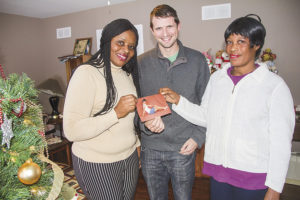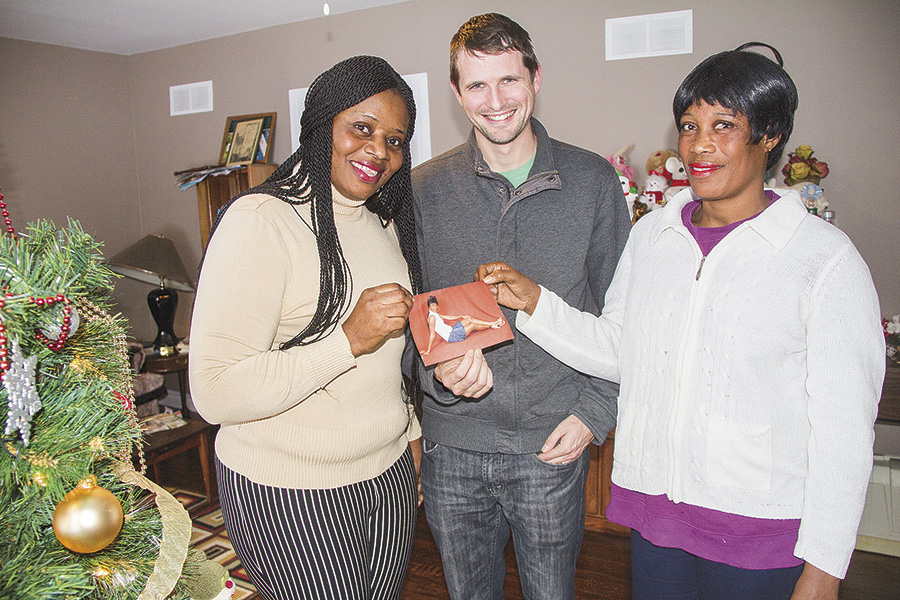
BY KIM LANGEN
A Christmas miracle has altered the world of a local mother.
Felicia Joh, who emigrated from Africa to Killarney last year as a sponsored refugee, got the shock of her life last month after an unexpected phone call took her by surprise.
The call came from a neighbour that she once shared a connected home with in Liberia – the African country Felicia first fled as a refugee – who had spotted one of Felicia’s missing daughters browsing in a huge outdoor market in Abidjan, Ivory Coast.
“My neighbour, Marie Gredier, was shopping in the market, and she thought she recognized this girl as my daughter,” said Joh. “She looked at her, and she knew that it was my daughter, but she wanted to be sure, and she asked her, ‘What is your mother’s name?’ She asked her, ‘Where is your mother?’ And my daughter said she hadn’t seen me since 2010. My daughter had been in the market that day, shopping with her friend. ”
Decontee, aged 26, is one of Joh’s missing twin daughters, and it was something of a miracle that on that day, November 9, Gredier happened to see her, recognize her face, and made the momentous connection.
The very next day Gredier was on the horn.
“She phoned me on November 10, and she said, ‘Felicia – surprise!’” said Joh. “I said, ‘What is going on?’ And she said, ‘I have a surprise gift for you. I am with your children.’ And then she put my daughter on the phone.”
Until this point, Joh did not know whether any of her children had survived the civil war in Ivory Coast.
She had become separated from both her twin girls, Decontee and Degnan, and younger daughter Emma, now age 20, along with her two sisters, Vivane and Benitor.
The rift had occurred in 2010, while her children were visiting with their aunts in Ivory Coast, and Felicia was in another part of the country seeking work.
Conditions worsened suddenly in the war-torn country, and contact between Joh and her family members was abruptly severed.
The joyous reunion over a phone line six years later was intensely emotional, she said.
“I was crying and weeping,” said Joh. “It was just a dream. I couldn’t imagine it. I yelled out on the phone. I was crying, she was crying, and my sisters were crying. All three of my children had been living with my sisters for the last while – I don’t know how many years. They were all safe.”
Joh says the reason it took so long to find each other was probably due to the two parties being on different refugee registration lists.
Organizations such as the International Red Cross or countries themselves create lists of refugees, but cross-referencing does not always occur.
Sometimes the social pages of Facebook help to connect families. And that’s the way that Joh had kept up with her friend Gredier, and what eventually led to the dramatic phone call.
“Marie and I are on Facebook, and we are still in contact with our friends,” she said. “We always hoped that someone would see our children. We didn’t know if they were even alive. We still don’t know what each other has been through in all these years.”
Joh has spoken with her children and sisters just twice since that initial call. That’s because the cost of telephone calls from Africa, at around $1.75 per minute, is prohibitive for families living there on a tiny budget.
The Killarney Refugee Sponsorship Committee (KRSP), who worked in partnership with the Canadian Government to help bring Felicia Joh, along with her friend Zoe Dickson and Dickson’s young son William, to Killarney last year, is hoping to improve communications between the two.
In time, they will hopefully learn the whole story of how each side had survived in the years since their escape in the fall of 2010 from Liberia.
“For now we will be seeking a good international rate on their phone calls,” said Danny Groening, pastor of the Killarney Mennonite Church, and a member of KRSP.
“Eventually we are hoping to re-unite the family. That’s Felicia’s desire, and the desire of her children. We have a meeting planned for January to discuss the idea of bringing the children here, and to see what options are at our disposal, and to see if we can help make that reunion a reality. We also know that these things aren’t easy.”
Joh said that she is now focusing her prayers on creating a new life for her children in this country.
“My hope is that I pray to God for the sponsorship to bring my children to Canada,” she said. “They want to be here right now. In Ivory Coast living conditions are bad. Now there is no war, but for refugees it is hard. They say they are trying to live, but it’s not easy. In Ivory Coast, your life is at risk. There is no future. Liberian refugees can’t get work, they can’t buy a house, people won’t rent to them, and they are blamed for war coming to Ivory Coast. The life we had in Africa – we were in hell. We slept outside, under bushes, with maybe some plastic sheets, for years, just to stay alive.”
Pastor Groening said that this recent news of Joh’s children was a godsend at Christmas.
“Everyone in our group is excited,” he said. “We know that God has answered a prayer. We had prayed that these children would be found, and they were. It was one of those God-things.”
And now they are hoping for another miracle.
Pastor Groening said they will continue to pray that Zoe Dickson’s other child, 25-year-old daughter Olivia Dickson, may also be located safe and well.
“I saw her in 2002,” said Zoe Dickson. “I don’t know if she is alive. We still have hope.”
The two women have been slowly settling into town – and a very different way of life – since their arrival in July.
Both have recently been volunteering at Bayside Personal Care Home, where they have been improving their English proficiency, making friends, and helping residents there with activities, going on walks at the facility, and sharing their stories.
Joh and Dickson also expressed their on-going joy of having a safe home in Killarney, support, and just simply having a roof over their heads.
“We can’t imagine that we have the life we do today in Killarney, with people who care for us,” said Joh. “We are so grateful. We are also grateful to tell our story, because it is impossible for people here to imagine our lives as refugees. No one can imagine it.”


